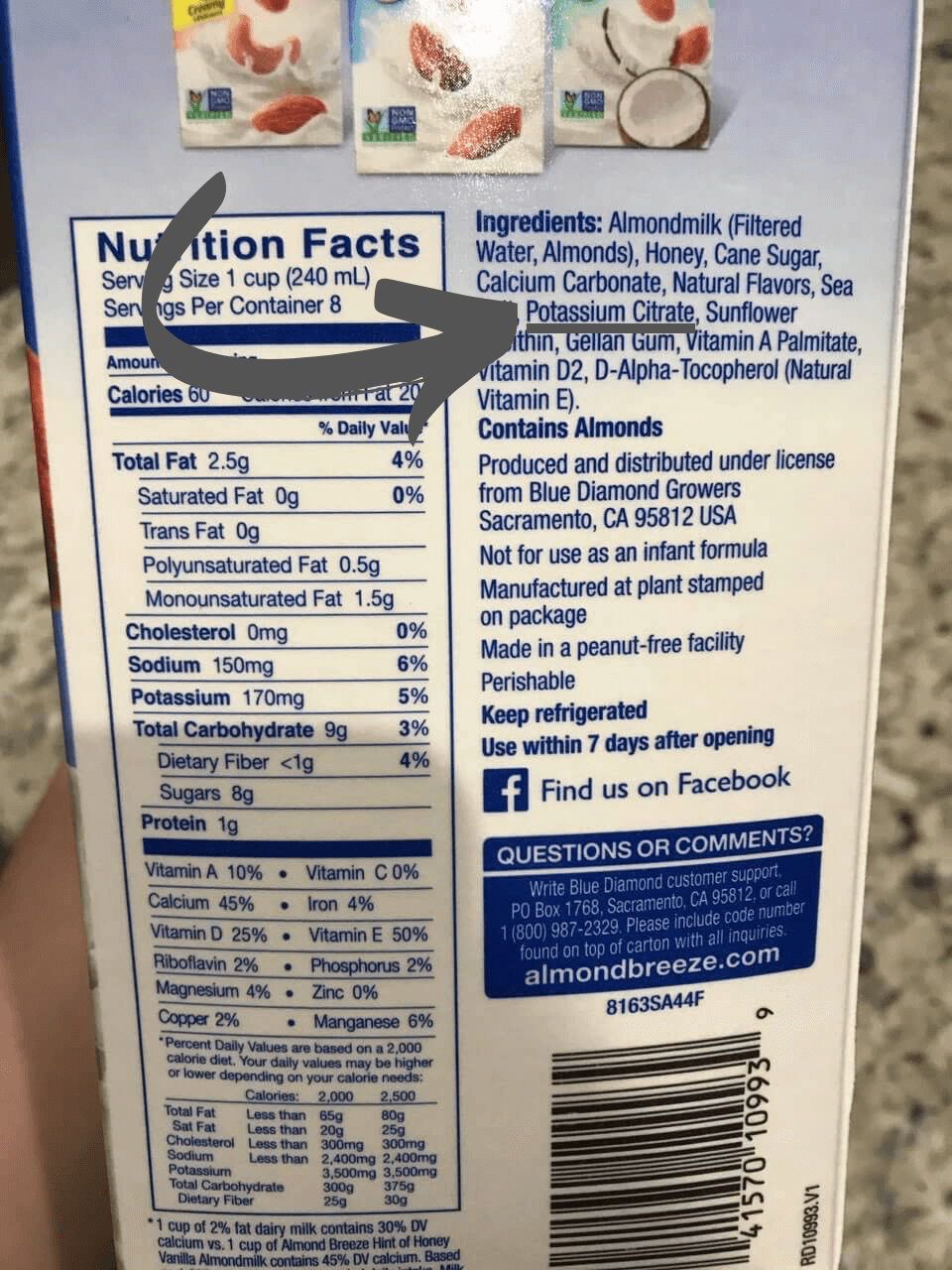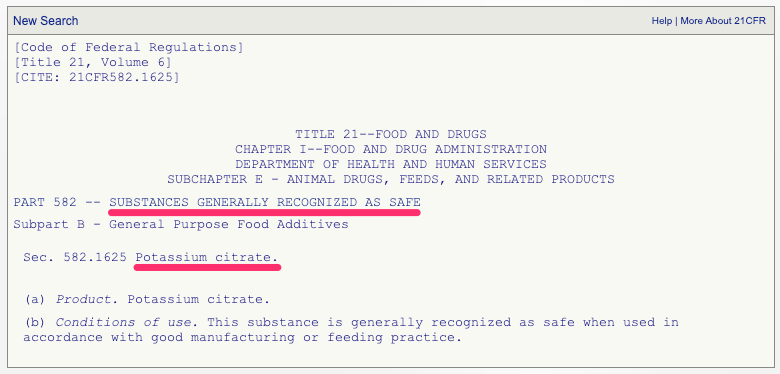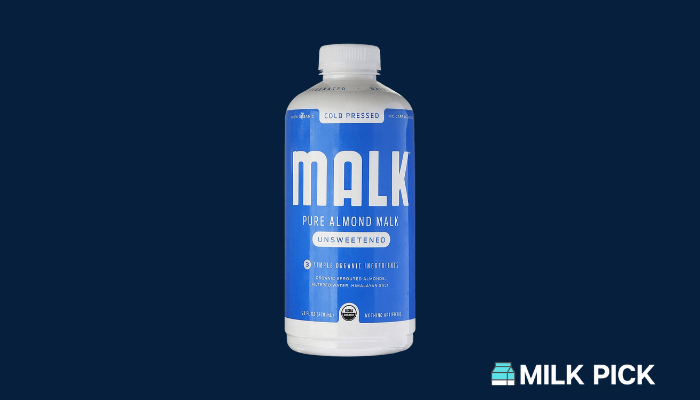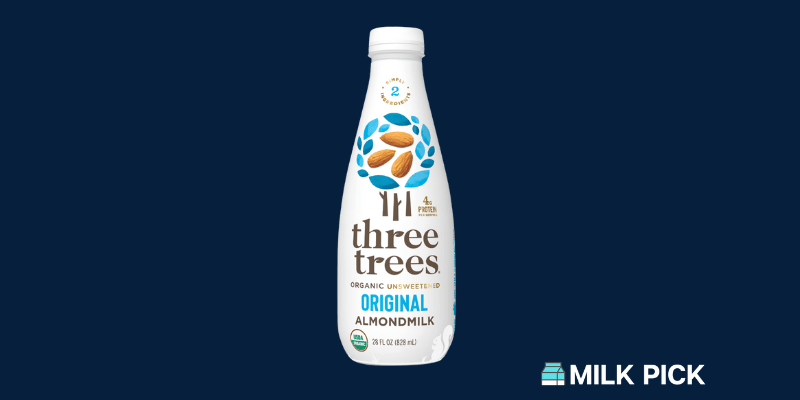Some plant-based milk contains various ingredients to help them stay shelf-stable and add nutritional benefits.
One ingredient you may come across is potassium citrate—an additive that helps non-dairy milk maintain a neutral pH, preventing curdling and other unwanted changes in the beverage's texture, taste, and smell.
While potassium citrate is generally safe, there are several facts you may want to know about this additive before consuming it in your almond or oat milk.
Learn more about potassium citrate, whether it is safe, and where you may want to get your daily potassium instead.
What is Potassium Citrate?
Potassium citrate is a form of potassium, a nutrient our bodies need for muscular and nervous system health.
Potassium citrate is a manufactured food additive created by neutralizing potassium salt from citric acid.
The substance typically appears as an odorless white powder or transparent crystals.

Is Potassium Citrate a Natural Ingredient?
Potassium citrate is a synthetic food additive.
To make potassium citrate, manufacturers link potassium salt to citric acid.
This creates a substance that is added to foods or used as a medical supplement for people with certain health issues, like kidney stones.
When created as a supplement, it is typically combined with molecules like chloride, carbonate, or hydroxide to form a salt; however, these compounds are not added to potassium citrate as a food additive.
Why Is Potassium Citrate In Plant-Based Milk?
There are two primary reasons that potassium citrate is added to dairy-free milk.
The first is that potassium citrate has a small amount of nutritional value.
It adds potassium to the product, which can benefit some people who may not get enough potassium from other sources.
However, the amount of potassium citrate added is usually not enough to make a difference in someone’s RDA of the nutrient.
The second and primary reason behind putting potassium citrate in vegan milk products is that it acts as a preservative and pH balancer for the beverage.
Potassium citrate is a buffering ingredient that helps nut-based milk like almond milk maintain its pH at a neutral level, about 7.5 to 9.
This elongates the shelf-life of a product, keeping it fresher for consumers. It also allows the milk manufacturer to sell more products.
While this can be a good thing, especially for those buying non-refrigerated shelf-stable vegan milk, it means the product is less fresh and likely contains additional food additives.
Products that don’t contain preservatives like potassium citrate are often fresher, use fewer ingredients, and are better for your overall health.
Is Potassium Citrate Good For You?
Potassium citrate carries a GRAS (Generally Recognized As Safe) classification from the FDA.

It is used as a food additive but also as a medication for people with low potassium levels.
In general, potassium citrate is a relatively neutral substance regarding health and safety.
Healthy adults need about 4.7 grams of potassium per day to keep their bodies running optimally.
Most plant-based milk containing potassium citrate has a negligible amount of the additive, up to 2% of the recommended daily allowance.
However, when consumed with other potassium-citrate-heavy foods, this additive can create issues for your body.
The possible benefits of potassium citrate are explored below, followed by reasons you may want to avoid it.
Possible Benefits of Potassium Citrate
As a natural nutrient, potassium is vital to our health.
It acts as an electrolyte, balancing fluid levels in the body. It's also essential to heart health and can help alkalize the body, keeping all systems running smoothly.
Potassium citrate can help some people meet their daily potassium needs, but because it's a synthetic source, it doesn’t work as well as the natural potassium found in foods.
When consumed from natural sources, like fruits and vegetables, the body processes potassium slowly, allowing it to absorb and perform its role as an electrolyte.
Potassium citrate supplements are sometimes prescribed to treat kidney stones because it neutralizes acids that can cause stone formation.
It can help reduce high blood pressure in people with hypertension.
This can lower the risk of stroke or heart attack.
Potassium citrate may also aid calcium balance throughout the body, possibly improving bone health.
Downsides of Potassium Citrate
Potassium can rapidly impact blood pressure, which is why taking it in additive form and large amounts can be dangerous for some people.
While drinking a cup of almond milk with potassium citrate won’t have the same effect as taking a pharmaceutical dosage, it's important to understand the effects of too much of this substance on the body.
Medical Usage Side Effects
Potassium citrate, in large doses, can cause serious damage to the heart and other bodily systems.
Side effects of potassium citrate in pharmaceutical uses can include:
- Discolored stool
- Confusion or dizziness
- Cardiac arrhythmia (irregular heart rate)
- Increased blood pressure
- Numbness in extremities
- Seizures
- Muscle twitching
- Weakness
- Irritability and restlessness
You are highly unlikely to experience these side effects from drinking almond or oat milk with added potassium citrate.
However, this additive can have a powerful effect on the body in high quantities.
Lack of FDA Oversight
In addition to medical usage concerns, you may want to avoid potassium citrate for a few other reasons.
The FDA classified it as GRAS for food, the only qualification being that manufacturers use “current good manufacturing practices (CGMP).”
This means that the FDA is in charge of monitoring labs that make food products and ensuring they follow CGMP.
It's worth considering how much oversight may go into creating such an additive, especially if you plan to consume it daily, and whether it might be better to forgo lab-made additives altogether.
Effects of Too Much Potassium Citrate In Western Diets
Even when not used as a medical supplement, potassium citrate may negatively affect your health.
According to a 2021 study of European foods (which are similar, if not less processed, than U.S. foods), researchers found that 37.6% of foods analyzed contained potassium additives.
The foods were mostly ready-to-eat and processed products.
While the study focused on finding hidden potassium and its impact on chronic kidney disease management, the results highlight the prevalence of potassium citrate additives in food and how daily ingested amounts might add up more quickly than desired.
Another study found that an increased intake of dietary potassium can have a significant impact on progressively rising blood pressure levels.
Studies like this show that eating food products with added potassium can negatively impact your health over time.
Who Should Avoid Potassium Citrate?
While most people can drink milk containing potassium citrate in regular amounts with no adverse health issues, anyone looking to eat fewer processed foods should consider avoiding the additive.
People with specific health issues, such as kidney disease, heart disease, or Addison’s Disease, or who already have high sodium or potassium blood levels should also consider buying milk without added potassium citrate.
Additive-Free Plant Based Milk Brands
You can choose from several milk brands that don’t contain additives like potassium citrate. The following options give you additive-free milk:
Malk Organics
Malk Organics’ unsweetened and vanilla milk are excellent options to avoid potassium citrate and other additives.
The vanilla option contains water, almonds, Himalayan salt, and vanilla extract, along with 70 grams (2% of RDA) of natural potassium.
The unsweetened version contains the same amount of potassium and ingredients, minus the vanilla.

Three Trees
Three Trees almond milk only contains almonds and water, making it as close to homemade as possible.
It contains 125 mg of potassium naturally, about 2% of your RDA.

New Barn Organics
New Barn Organics almond milk is also free of additives, containing only filtered water, organic almonds, and sea salt. It contains about 6 grams of potassium per serving.

Final Thoughts on Potassium Citrate and Non-Dairy Milk
Like many food additives, potassium citrate is a mostly benign substance when consumed in small amounts.
While it can help extend the shelf-life of shelf-stable or refrigerated almond milk, it carries little to no nutritional value in helping you meet daily potassium needs.
One cup of a popular store-bought almond milk brand containing potassium citrate has about 170 mg of potassium, only 4% of the RDA (and only 2% more than organic brands with no additives).
This product also contains ingredients like Calcium Carbonate, Sunflower Lecithin, Gellan Gum, and Vitamin A Palmitate, all of which can negatively affect your health.
It’s better to get potassium from natural sources, like fruits, vegetables, and legumes, than through added potassium citrate.
When it comes to almond, oat, cashew, or other plant-based milk, drinking organic brands or brands that are additive-free is your best bet.
Plus, despite what many people think, they aren’t that much more expensive than processed brands with additives.
